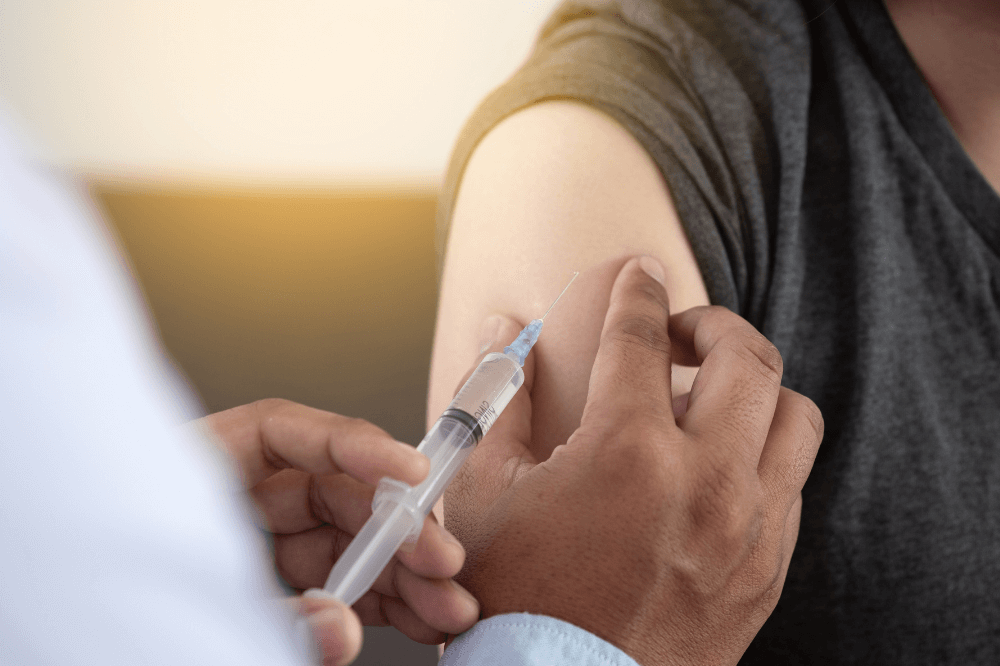
Read the Michigan Bishops’ March 3, 2021 statement re: the Johnson & Johnson Vaccine:
in PDF format (English | Español) or see below.
Answers to Key Ethical Questions About COVID-19 Vaccines (USCCB): English and Español
Moral Considerations regarding COVID-19 Vaccines (Michigan Catholic Conference)
Catholic scholars: Any available COVID-19 vaccine is morally acceptable (Catholic News Service)
What to know about Vaccine Safety, Effectiveness and Distribution (Vaccinate West Michigan)
March 3, 2021
Dear Sisters and Brothers in Christ,
Peace be with you!
As vaccines for COVID-19 continue to become available, we wish to address the moral questions that have arisen, insofar as some vaccines are developed using cells lines that have originated from the tissue taken from babies who were aborted decades ago.(1) Abortion is a grave evil, and we must avoid complicity in abortion. Let us also pray for God’s peace, healing, and mercy for all those who have had abortions.
It is morally permissible to receive the vaccines developed by Pfizer and Moderna. Neither of these vaccines have used cell lines originating in tissue taken from aborted babies in their design, development, and production. However, both the Pfizer and the Moderna vaccine did use such a cell line in the confirmatory testing. This connection to the abortion is very remote, however, and it is important to keep in mind that there are varying levels of responsibility. Greater moral responsibility lies with the researchers than with those who receive the vaccine. The Congregation for the Doctrine of the Faith has indicated that it is morally permissible to be vaccinated if there are no alternatives and there are serious health risks.(2) Such serious health risks are present due to the current pandemic.
The vaccines developed by Johnson & Johnson and AstraZeneca are more morally problematic, however. They utilized in the design, production, development, and confirmatory testing a cell line that originated from tissue taken from an aborted baby. These vaccines may be received only if there are no other alternatives. If one does not have a choice of vaccine and a delay in immunization may bring about serious consequences for one’s health and the health of others, it would be permissible to accept the Johnson & Johnson or AstraZeneca vaccine. Both are somewhat similar in production to the Rubella vaccine, which the Pontifical Academy of Life indicated could be received for grave reasons and if there are no other alternatives.(3)
If one were to choose not to be vaccinated, one would have a moral responsibility to embrace the necessary precautions to avoid spreading the disease to others.
At this same time, we join our voices to call for the development of vaccines that have no connection to abortion. Our consciences must not be dulled, nor may we imply in any way that abortion is acceptable.
Let us implore the intercession of the Blessed Virgin Mary, that God may bring an end to the pandemic and that all esteem and respect the dignity of human life.
Most Rev. Allen H. Vigneron, Archbishop of Detroit
Most Rev. Earl A. Boyea, Bishop of Lansing
Most Rev. Paul J. Bradley, Bishop of Kalamazoo
Most Rev. John F. Doerfler, Bishop of Marquette
Most Rev. Robert D. Gruss, Bishop of Saginaw
Most Rev. Walter A. Hurley, Apostolic Administrator, Diocese of Gaylord
Most Rev. David J. Walkowiak, Bishop of Grand Rapids
1 For more on the morality of COVID-19 vaccines, see the joint statement of the chairmen of the USCCB Committee on Doctrine and Pro-Life Activities on which our statement is based. For more information about specific vaccines being developed for COVID-19 see this reference chart from the Charlotte Lozier Institute.
2 Congregation for the Doctrine of the Faith, Instruction on Certain Bioethical Questions (Dignitas Personae) (2008), nos. 35-36: Instruction Dignitas Personae on Certain Bioethical Questions, Congregation for the Doctrine of the Faith (vatican.va)
3 Pontifical Academy for Life, “Moral Reflections on Vaccines Prepared from Cells Derived from Aborted Human Foetuses,” (9 June 2005) in National Catholic Bioethics Quarterly 6:3 (2006): 541–49
Declaración en español:
3 de marzo de 2021
Queridos hermanos y hermanas en Cristo:
¡La paz sea con ustedes!
A medida que las vacunas para el COVID-19 continúan estando disponibles, queremos hablar de las cuestiones morales que han ido surgiendo, en la medida en que algunas vacunas se desarrollan usando líneas de células que se han originado a partir del tejido de bebés que fueron abortados hace décadas.(1) El aborto es un mal grave, y debemos evitar la complicidad en el aborto. Oremos por la paz, la sanación y la misericordia de Dios por todas aquellas personas que han abortado.
Está moralmente permitido recibir las vacunas desarrolladas por Pfizer y Moderna. Ninguna de esas vacunas ha usado en su diseño, desarrollo o producción, líneas celulares originadas en tejido tomados de bebés abortados. Sin embargo, tanto la vacuna de Pfizer como la de Moderna usaron una línea celular en las pruebas de confirmación. No obstante, esta conexión con el aborto es muy remota, y es muy importante tener en cuenta que hay varios niveles de responsabilidad. La Congregación para la Doctrina de la Fe ha expresado que es moralmente permisible ser vacunado si no hay alternativas y hay serios riesgos para la salud.(2) Esos riesgos graves para la salud están presentes debido a la actual pandemia.
Sin embargo, las vacunas desarrolladas por Johnson & Johnson y AstraZeneca son más problemáticas desde el punto de vista moral. Las cuales utilizan es su diseño, producción, desarrollo y pruebas de confirmación una línea celular que se originó a partir de tejido tomado de un bebé abortado. Estas vacunas pueden recibirse sólo si no hay otras alternativas. Si uno no puede elegir otra vacuna y un retraso en la vacunación puede ocasionar consecuencias graves para la salud de uno mismo y de los demás se permite aceptar la vacuna de Johnson & Johnson o de AstraZeneca. Su producción es algo similar a la vacuna contra la rubéola, que la Academia Pontificia para la Vida indicó que podría recibirse por razones graves y si no hay otras alternativas.(3)
Si uno decidiera no vacunarse, tendría la responsabilidad moral de adaptar las precauciones necesarias para evitar la propagación de la enfermedad a otros.
Al mismo tiempo, unimos nuestras voces para pedir por el desarrollo de vacunas que no tengan conexión con el aborto. Nuestras conciencias no deben entorpecerse, ni por ninguna manera debemos insinuar que el aborto es aceptable.
Imploremos la intercesión de la Bienaventurada Virgen María, para que Dios ponga fin a la pandemia y que todos estimen y respeten la dignidad de la vida humana.
Excelentísimo Allen H. Vigneron, Arzobispo de Detroit
Excelentísimo Earl A. Boyea, Obispo de Lansing
Excelentísimo Paul J. Bradley, Obispo de Kalamazoo
Excelentísimo John F. Doerfler, Obispo de Marquette
Excelentísimo Robert D. Gruss, Obispo de Saginaw
Excelentísimo Walter A. Hurley, Administrador Apostólico, Diócesis de Gaylord
Excelentísimo David J. Walkowiak, Obispo de Grand Rapids
1 Para más información acerca de la moralidad de la vacunas en contra del COVID-19, véase la declaración conjunta de los presidentes del Comité de Doctrina y Actividades Pro-Vida de la Conferencia de Obispos Católicos Estadounidenses (USCCB) en la qe se basa nuestra declaración: moral-considerations-covid-vaccines (usccb.org)
https://www.usccb.org/news/2021/us-bishop-chairmen-doctrine-and-pro-life-address-use-johnson-johnson-covid-19-vaccine
Para más información acerca de las vacunas específicas que se están desarrollando para el COVID-19 vea esta tabla de referencia de Charlotte Lozier Insitute: COVID-19-Vaccine-Candidates-and-Abortion-Derived-Cell-Lines.pdf (lozierinstitute.org)
2 Congregación para la Doctrina de la Fe, Instrucción sobre algunas cuestiones de bioética (Dignitas Personae) (2008), núms. 35-36: Instruction Dignitas Personae on Certain Bioethical Questions, Congregation for the Doctrine of the Faith (vatican.va)
3 Pontificia Academia para la Vida, “Moral Reflections on Vaccines Prepared from Cells Derived from Aborted Human Foetuses,” (9 de junio de 2005) en National Catholic Bioethics Quarterly 6:3 (2006): 541-49
Michigan Bishops’ December 18, 2020 statement re: the Pfizer, Moderna, and AstraZeneca Vaccines:
English | Español
COVID-19 Response in the Diocese of Grand Rapids
From the USCCB
U.S. Bishop Chairmen for Doctrine and for Pro-Life Address the Use of the Johnson & Johnson Covid-19 Vaccine (March 2, 2021)
Los Presidentes de los Comités de Doctrina y Actividades Pro-Vida de la USCCB se Pronuncian Sobre el Uso de la Vacuna de Johnson & Johnson contra el Covid-19 (2 marzo 2021)



